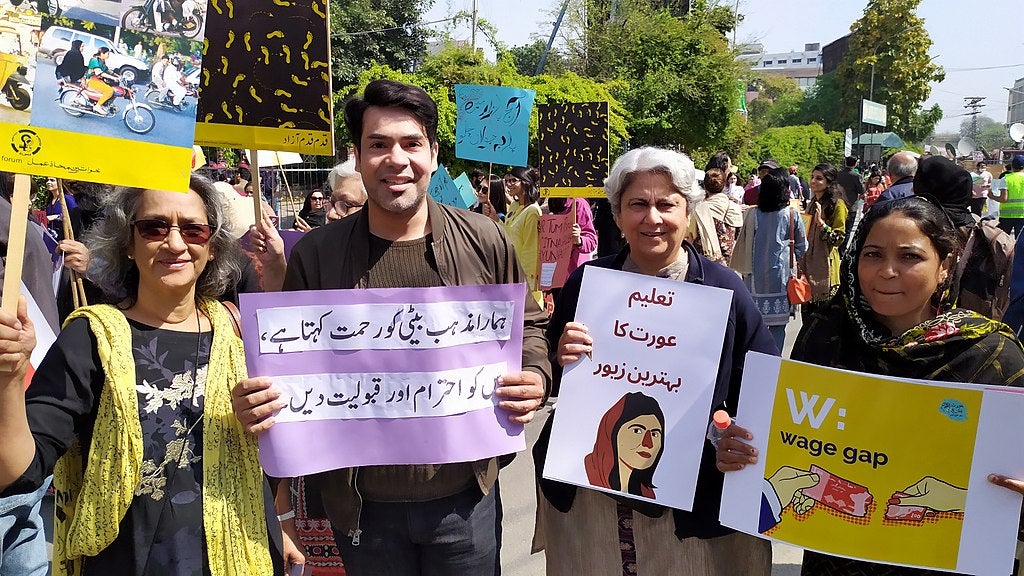Aurat March: The Struggle for Law Reform and Women’s Rights in Pakistan
Kunthavi Kalachelvam, Imran Ahmed
26 April 2021Summary
The Aurat March (Women’s March), which first took place in Karachi in 2018 to observe the International Women’s Day, advocates for women’s rights through the lens of legal empowerment. The march gradually evolved into a social movement with a long-term plan to institutionalise solutions that would withstand changing political tides and extirpate harmful cultural norms. The reform of three Acts – the Anti-Rape Ordinance 2020, the Protection Against Harassment of Women at the Workplace Act, 2010, and the Child Marriage Restraint Act 1929 – features as the focus of the movement’s recent activism. Despite its success in provoking debate and raising awareness concerning gender inequities in Pakistan, the organisers of the Aurat March and the movement, more broadly, face significant challenges.
The rights of women in Pakistan have been a longstanding point of both scholarly inquiry and broader public debate and international interest. Since the Zia ul Haq era, for instance, the question of how Islamic legal norms infringe, undermine or obfuscate the realisation of fundamental rights granted to women has been a significant source of public and intellectual contestation. In the age of the #MeToo movement, the importance of such rights has acquired a renewed critical focus on the structural, social and cultural factors which perpetuate gender disparities in Pakistan. Violence, harassment, intimidation and discrimination experienced by women in the workplace as well as in public and private spaces are also under the spotlight. This critical focus has decidedly looked to legal reform as a fundamental instrument towards the realisation of a more just and equitable future in gender relations in Pakistan.
The Aurat March (Women’s March) which first took place in Karachi in 2018 to observe International Women’s Day (8 March) exemplifies this development. The march gradually evolved into a movement with women across Pakistan coming together to demand legal and cultural reforms. In the past two years, the march has been divided into different geography-based chapters. The Lahore chapter has been responsible for producing comprehensive manifestos targetting different themes in relation to women’s development. This year, its manifesto focused on women’s healthcare in Pakistan. The Karachi chapter held an extensive social media campaign to bring awareness to gender violence. All respective chapters have a common underlying goal: collective action that translates into better livelihoods for women. The organisers furthermore approach the concept of collective action through a holistic framework arguing that the alleviation of the structures of oppression is interconnected.
The Aurat March movement seeks both the introduction of new legislation as well as a wide range of broader legal reforms to existing laws. Three particular Acts feature as the focus for reform – Anti-Rape Ordinance 2020, Protection Against Harassment of Women at the Workplace Act, 2010, and the Child Marriage Restraint Act 1929. The Lahore chapter of the Aurat March in 2021, for instance, discussed the inherent flaw with the introduction of the Anti-Rape Ordinance. This law establishes special courts to try scheduled offences, creates a national sex offenders register, ordains the concealment of the identity of victims and allows for the chemical castration of some offenders. The Lahore manifesto argues that “medicalised interventions to prevent sexual assault, such as physical and chemical castration of those who commit sexual offences, is a short-term solution that perpetuates the faulty notion that rape is a crime of sexual desire rather than power.” The manifesto also makes the point that there is a severe lack of research and medical evidence to prove that chemical castration would decrease sexual crimes and recidivism. The 2020 Lahore manifesto demanded the Protection Against Harassment of Women at the Workplace Act to include the protection for working women that operate within “formal, informal and semiformal sectors” and include “independent and sub-contract workers within written or other contracts.” The 2021 Lahore manifesto looked at further strengthening the enactment of the Act. Despite the mandatory provisions existent in the Act, organisers argued that “most hospitals do not have functional sexual harassment committees.” Lastly, with the Child Marriage Restraint Act 1929, in both years’ manifestos, there is a demand to raise the minimum age of marriage to 18 for all women across Pakistan.
The reception to the Aurat March has been mixed and divided. Despite its success in provoking debate, raising awareness concerning gender inequities in Pakistan and garnering support from home and abroad, the organisers and the movement face significant challenges. While Islamist groups denounce the march’s activists and organisers as immoral or misguided blasphemers, others see the movement as a form of western cultural imperialism. Prime minister Imran Khan also argued that women were, in many instances, the source of the ills which face them. His recent comments, which connected the rise of rape incidents to women’s clothing choices, demonstrates that the space for advocating for women’s rights in Pakistan is squeezed between antagonistic and adversarial state and nonstate actors in the country.
. . . . .
Ms Kunthavi Kalaichelvam is a Research Trainee at the Institute of South Asian Studies (ISAS), an autonomous research institute at the National University of Singapore. She can be contacted at kunthavi@nus.edu.sg. Dr Imran Ahmed is a Visiting Research Fellow at the same institute. He can be contacted at iahmed@nus.edu.sg. The authors bear full responsibility for the facts cited and opinions expressed in this paper.
Photo credit: Wikimedia Commons
-
 More From :
More From :
-
 Tags :
Tags :
-
 Download PDF
Download PDF



